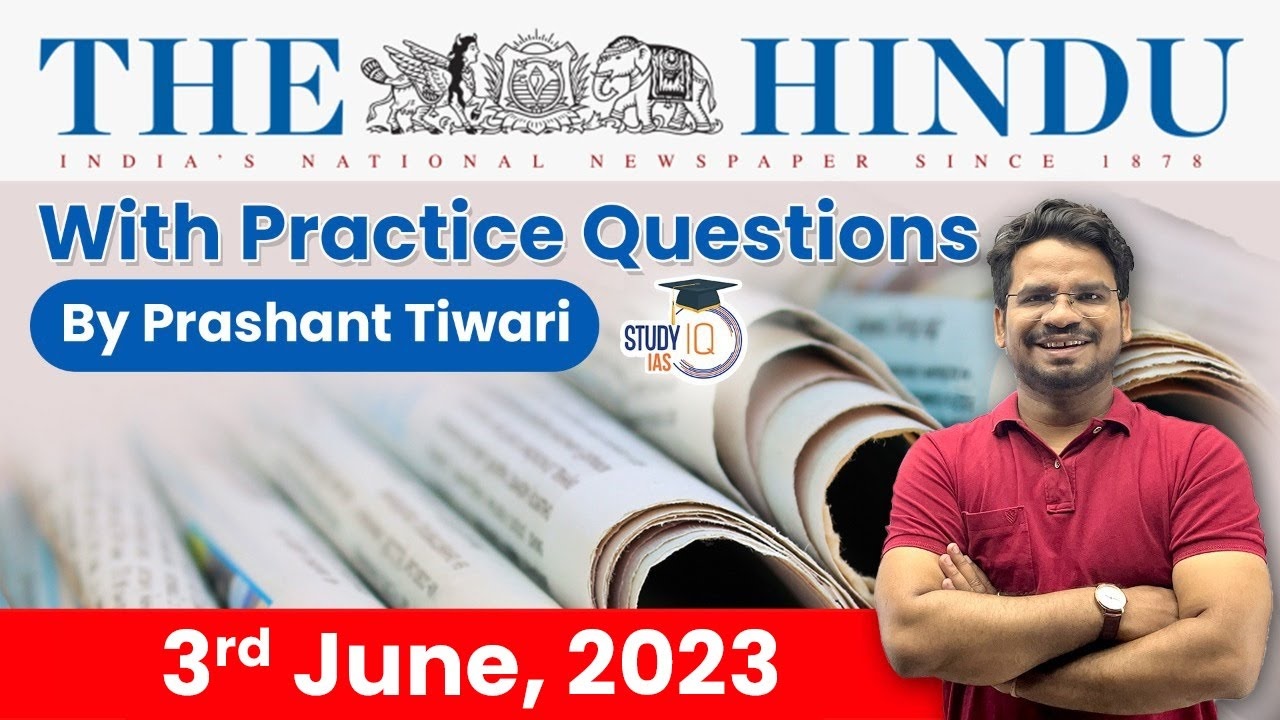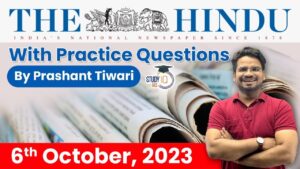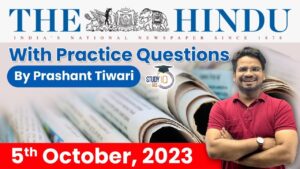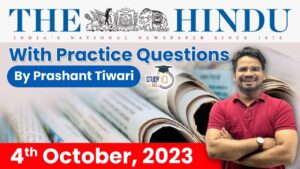The Hindu Newspaper Analysis for UPSC
- Reasons for lack of railway safety
- Lack of fire detection systems — in some trains, the fire alarm systems have been installed in air-conditioned coaches, while other compartments have been neglected. In open compartments, it is more difficult to detect smoke.
- Lack of anti-collision technologies — these are devices that automatically halt the train if it overshoots a red signal — India, which has the world’s fourth-largest railway network after the U.S. China and Russia, still doesn’t have such safety devices. Such technologies could have helped prevent the 32 train collisions that took place in India since 2008, according to official figures.
- Staff deficit — speeding and skipping red signals are the main causes of concern, human error is another common cause of accidents. The reason for this is partly that there is a shortage of staff, meaning that workers are often overworked.
The Hindu Editorial Today
- Inappropriate maintenance of tracks — significant number of accidents in India are caused by derailments and for this derelict tracks are to be blamed.
- About KAVACH System
- ‘Kavach’ literally means armour, is an indigenously developed Automatic Train Protection (ATP) system by Research Design and Standards Organisation (RDSO) in collaboration with Indian industry .
- It is a set of electronic devices and Radio Frequency Identification devices installed in locomotives, in the signalling system as well the tracks, that talk to each other using ultra high radio frequencies to control the brakes of trains and also alert drivers, all based on the logic programmed into them.
- It is meant to provide protection by preventing trains from passing the signal at Danger (Red) and avoiding collision.
- The European Union’s (EU) key climate law, the Carbon Border Adjustment Mechanism (CBAM), has spooked India. New Delhi fears that CBAM will cripple the export of its carbon-intensive products to the EU. While India’s exports may be limited to aluminium, iron, and steel, and affect only 1.8% of its total exports to the EU, India has reportedly decried CBAM as being protectionist and discriminatory.
- In 2005, the EU adopted an important climate change policy known as the Emissions Trading System (ETS). Now in its fourth stage, the ETS is a market-based mechanism that aims at reducing greenhouse gas (GHG) emissions by allowing bodies emitting GHG to buy and sell these emissions amongst themselves.
- Under the CBAM, imports of certain carbon-intensive products, namely cement, iron and steel, electricity, fertilizers, aluminium, and hydrogen, will have to bear the same economic costs borne by EU producers under the ETS.
- However, even if the EU’s CBAM is discriminatory, there could be a claim for justifying it under the General Exceptions clause given in Article XX of the General Agreement on Tariffs and Trade (GATT). Under Article XX, measures taken by countries that otherwise violate GATT obligations are permitted if, first, they fall under one of the listed policy grounds.
- One of the listed policy grounds in Article XX is ‘conservation of exhaustible natural resources’.
- Introduction
- The World Trade Organization (WTO) is an intergovernmental organization that regulates and facilitates international trade between nations.
- It officially commenced operations on 1 January 1995, pursuant to the 1994 Marrakesh Agreement, thus replacing the General Agreement on Tariffs and Trade (GATT) that had been established in 1948
- The WTO is the world’s largest international economic organization, with 164 member states representing over 98% of global trade and global GDP
- Also, WTO is the only global international organization dealing with the rules of trade between nations
- Generative artificial intelligence (AI) is AI that can create new data. There are many instances of generative AI in the world today, most commonly used to generate text, images, and code in response to users’ requests, even if they are capable of more.
- Inaction is just not an option: apart from the possibility of adverse consequences, it could render India missing the ‘harnessing AI for good’ bus.
- S. Secretary of State Antony Blinken said on Friday that there can be no cease-fire in the war in Ukraine unless it is part of a “just and lasting” peace deal that includes Russia’s military withdrawal.
- Blinken said “a cease-fire that simply freezes current lines in place” and allows Russian President Vladimir Putin “to consolidate control over the territory he has seized, and rest, rearm, and reattack — that is not a just and lasting peace.”
- Russia must also pay a share of Ukraine’s reconstruction and be held accountable for launching its full-scale invasion of its neighbour in February 2022, Mr. Blinken said in a speech during a visit to Finland, which recently joined NATO and shares a long border with Russia.
- The Law Commission may be considering to work on the issue of Uniform Civil Code, Justice Ranjana Prakash Desai (retd) said on Friday after a meeting with its Chairperson and members. Justice Desai heads the committee preparing a draft of the code for Uttarakhand.
- On Friday, the members of the Uttarakhand UCC panel, including Justice Desai, who is also the current head of the delimitation commission, and former Uttarakhand Chief Secretary Shatrughna Singh, met Law Commission chairperson Justice Ritu Raj Awasthi and members K.T. Sankaran, Anand Paliwal and D.P. Verma.
- About:
- UCC is one that would provide for one law for the entire country, applicable to all religious communities in their personal matters such as marriage, divorce, inheritance, adoption etc.
- Article 44 of the Constitution lays down that the state shall endeavour to secure a UCC for the citizens throughout the territory of India.
- Article 44 is one of the Directive Principles of State Policy (DPSP).
- DPSP as defined in Article 37, are not justiciable (not enforceable by any court) but the principles laid down therein are fundamental in governance.
- In order to bring uniformity, the courts have often said in their judgements that the government should move towards a UCC.
- The judgement in the Shah Bano case (1985) is well known.
- Another case was the Sarla Mudgal Case (1995), which dealt with issue of bigamy and conflict between the personal laws existing on matters of marriage.
- By arguing that practices such as triple talaq and polygamy impact adversely the right of a woman to a life of dignity, the Centre has raised the question whether constitutional protection given to religious practices should extend even to those that are not in compliance with fundamental rights.
- About Law Commission:
- The Law Commission of India is a non-statutory body constituted by the Government of India from time to time.
- It functions to the Ministry of Law and Justice as an advisory body.
- History:
- The first Law Commission was established during the British Raj era in 1834 by the Charter Act of 1833 and was chaired by Lord Macaulay.
- In 1955, the first independent Law Commission was created.
- Objective: To carry out research in the field of law and makes recommendations to the Government (in the form of Reports) as per its terms of reference.
- The commission’s recommendations are not binding on the Government.
- The Law Commission has so far submitted 277 Reports.
- The commission consists of legal experts and is headed by a retired judge.
- The Commission is constituted for a fixed tenure.
Sharing is caring!


 The Hindu Newspaper Analysis 6 October 2...
The Hindu Newspaper Analysis 6 October 2...
 The Hindu Newspaper Analysis 5 October 2...
The Hindu Newspaper Analysis 5 October 2...
 The Hindu Newspaper Analysis 4 October 2...
The Hindu Newspaper Analysis 4 October 2...





















